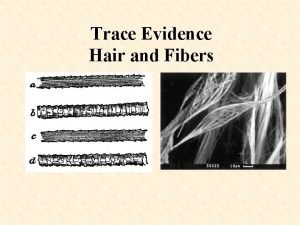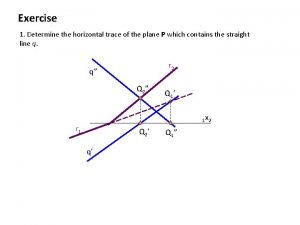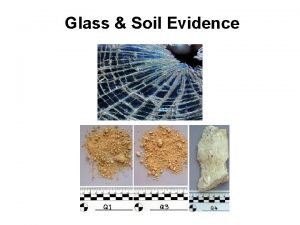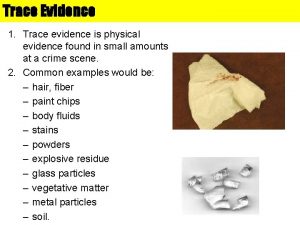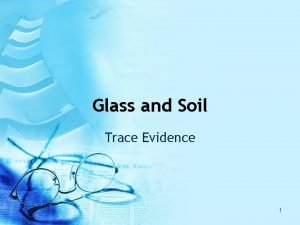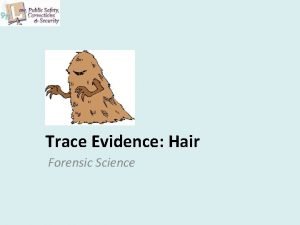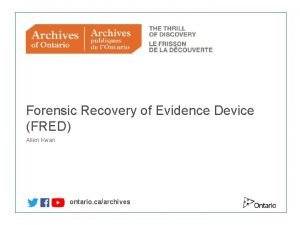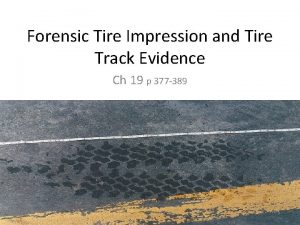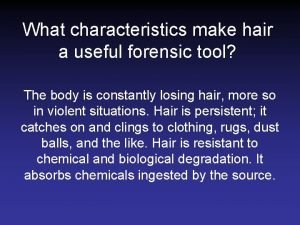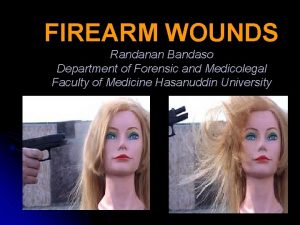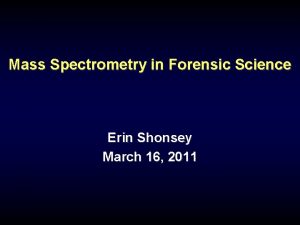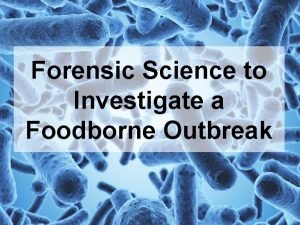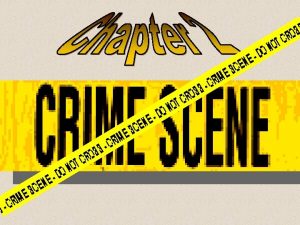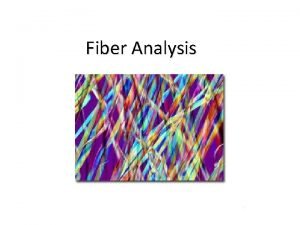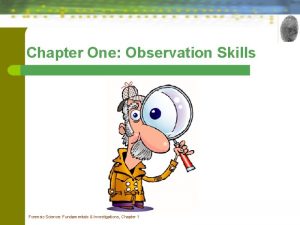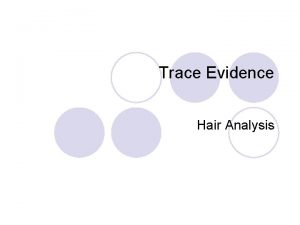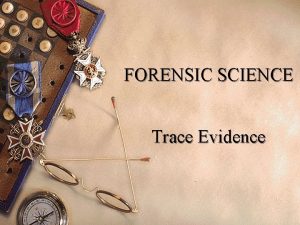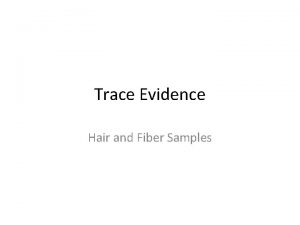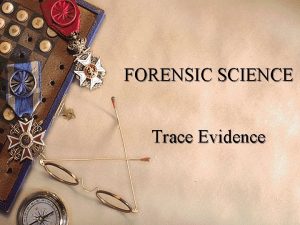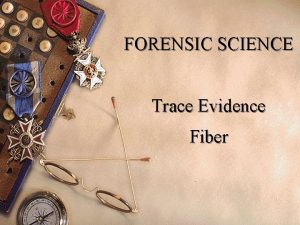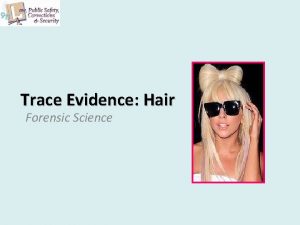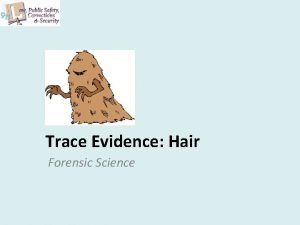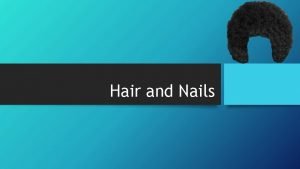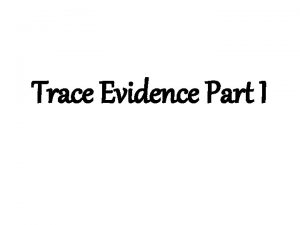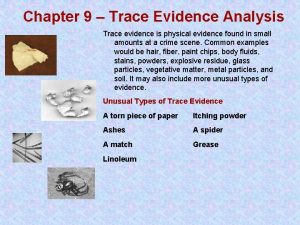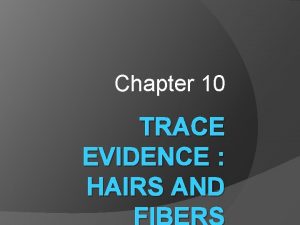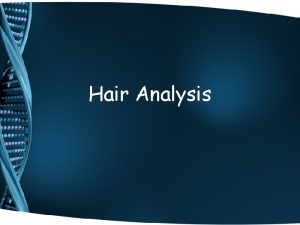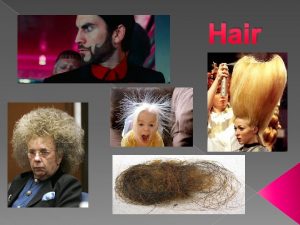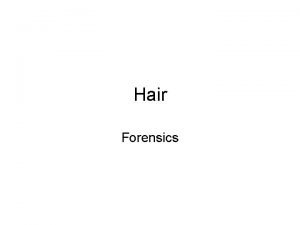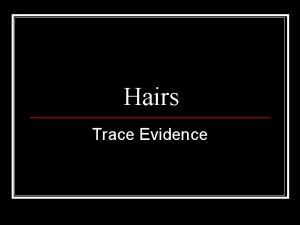Trace Evidence Hair Forensic Science Hair is A













































- Slides: 45

Trace Evidence: Hair Forensic Science

Hair is • A slender threadlike outgrowth from the follicles of the skin of mammals • Found all over our bodies – Head – Face – Chest – Limbs (arms and legs) – Pubic region Copyright © Texas Education Agency 2011. All rights reserved. Images and other multimedia content used with permission. 2

Structure (continued) • Major constituents – Keratin is a protein that makes up most of the hair shaft. – Melanin is a pigment that gives hair its color. – Redheads have pheomelanin instead of melanin. Copyright © Texas Education Agency 2011. All rights reserved. Images and other multimedia content used with permission. 3

Structure (continued) • Cortex – the main body (wooden portion) • Medulla – the central cell of the cortex that is not always present in every hair (lead) • Cuticle – a layer of scales covering the hair shaft (yellow paint) Pencil vs. Hair Copyright © Texas Education Agency 2011. All rights reserved. Images and other multimedia content used with permission. 4

Structure (continued) Copyright © Texas Education Agency 2011. All rights reserved. Images and other multimedia content used with permission. 5

Sample Photomicrographs Continuous Clear Medulla Continuous Wafer Medulla Opaque Medulla Copyright © Texas Education Agency 2011. All rights reserved. Images and other multimedia content used with permission. 6

Sample Photomicrographs Discontinuous Medulla Bubbly or Coarse Cellular Medulla Appearance Copyright © Texas Education Agency 2011. All rights reserved. Images and other multimedia content used with permission. 7

Characteristics Copyright © Texas Education Agency 2011. All rights reserved. Images and other multimedia content used with permission. 8

Characteristics • Pigment • Colors – light, medium, dark; reddish-brown, black, etc. • Sizes – fine, moderate, large • Density – light, moderate, heavy • Distribution – random, peripheral, even, central, one -sided Dyed Human Hair Copyright © Texas Education Agency 2011. All rights reserved. Images and other multimedia content used with permission. 9

Characteristics (continued) Various Pigment Distributions One-Sided Peripheral in Human Hair Random in Animal Hair Central in Red Human Hair Copyright © Texas Education Agency 2011. All rights reserved. Images and other multimedia content used with permission. 10

Characteristics (continued) • Ovoid bodies – spherical to oval solid structures found mostly in cattle and dog hairs, but present in some human hairs Ovoid Bodies in human hair Ovoid Bodies in dog hair Copyright © Texas Education Agency 2011. All rights reserved. Images and other multimedia content used with permission. 11

Characteristics (continued) • Cortical fusi – elongated, spindle-shaped air spaces in the cortex • Special characteristics, cuticle damage, artificial treatment Cortical Fusi Copyright © Texas Education Agency 2011. All rights reserved. Images and other multimedia content used with permission. 12

Roots • 3 stages of growth determined by the root (proximal end) – Anagen root – an active growth stage, often found with a ribbon-like tip and a follicular tag (a soft tissue from the follicle) – Catagen root – the intermediate stage of growth – Telogen root – a resting stage, has a bulblike shape. Often found with very little pigment and an abundance of cortical fusi. Copyright © Texas Education Agency 2011. All rights reserved. Images and other multimedia content used with permission. 13

Roots (continued) Anagen Catagen Copyright © Texas Education Agency 2011. All rights reserved. Images and other multimedia content used with permission. Telogen 14

Roots (continued) • Hairs that are forcibly removed often end up with a follicular tag (a soft tissue from the follicle) attached to the roots. • The follicular material may be suitable for nuclear DNA analysis. telogen root without follicular tag telogen root with follicular tag Copyright © Texas Education Agency 2011. All rights reserved. Images and other multimedia content used with permission. 15

Roots (continued) • Postmortem Root Band (aka "Dead man's root”) a dark band that may appear near the root of the hair originating from a decomposing body Copyright © Texas Education Agency 2011. All rights reserved. Images and other multimedia content used with permission. 16

Distal Ends Scissor-cut Abraded Razor-cut Rounded Burnt hair Broken Copyright © Texas Education Agency 2011. All rights reserved. Images and other multimedia content used with permission. 17

Human & Animal Hair 3 Main differences Human Hair Pigment Medulla Scale Structure Animal Hair remains constant in its color often exhibits rather rapid and pigmentation throughout and radical color changes the length of the shaft very wide; its structure is thin, taking up no more than very regular and well 1/3 of the hair shaft defined (with certain diameter; amorphous patterns) some have coronal has overlapping imbricate (crown-shaped) scales or (or flattened) scales with spinous (petal-shaped) narrow margins scales Copyright © Texas Education Agency 2011. All rights reserved. Images and other multimedia content used with permission. 18

Human & Animal Hair (continued) Human Animal Medulla Copyright © Texas Education Agency 2011. All rights reserved. Images and other multimedia content used with permission. 19

Human & Animal Hair (continued) Rabbit hair Uniserial Ladder Medulla Multiserial Ladder Medulla Copyright © Texas Education Agency 2011. All rights reserved. Images and other multimedia content used with permission. 20

Scales Imbricate Scales Human Imbricate Scales Coronal Scales Diagram Bat Hair Copyright © Texas Education Agency 2011. All rights reserved. Images and other multimedia content used with permission. 21

More Examples Spinous Scales Diagram Mink hair Cellular Medulla In opossum hair Isodiametric Scales In Deer hair Copyright © Texas Education Agency 2011. All rights reserved. Images and other multimedia content used with permission. 22

Racial Origin • Caucasian – moderate shaft diameter with very little variation – light to moderate pigment density with fairly even distribution – oval-shaped cross-section Copyright © Texas Education Agency 2011. All rights reserved. Images and other multimedia content used with permission. 23

Racial Origin (continued) Caucasian Head Hair cross-section Caucasian Head hairs Copyright © Texas Education Agency 2011. All rights reserved. Images and other multimedia content used with permission. 24

Racial Origin (continued) • Mongoloid – coarse shaft diameter – streaky pigments with heavy density – thick cuticle – round cross-section Copyright © Texas Education Agency 2011. All rights reserved. Images and other multimedia content used with permission. 25

Racial Origin (continued) Mongoloid Head Hairs Copyright © Texas Education Agency 2011. All rights reserved. Images and other multimedia content used with permission. 26

Racial Origin (continued) • Negroid – fine to moderate shaft diameter – considerable variation throughout the hair shaft with prominent twists and curls – heavy pigment density with aggregate pigment clumpings – flat cross-section Copyright © Texas Education Agency 2011. All rights reserved. Images and other multimedia content used with permission. 27

Racial Origin (continued) Negroid head hairs Copyright © Texas Education Agency 2011. All rights reserved. Images and other multimedia content used with permission. 28

Variations Why do we need to examine each hair sample from root to tip? Five Regions of a single head hair Copyright © Texas Education Agency 2011. All rights reserved. Images and other multimedia content used with permission. 29

Variations (continued) One person's head hair One person of multiple race Copyright © Texas Education Agency 2011. All rights reserved. Images and other multimedia content used with permission. 30

Somatic Origin Hairs from different parts of the body exhibit different characteristics: • Head hairs – Typically much longer than other hairs on the body – Generally soft and most likely to have artificial treatment (bleaching, dyes) • Pubic hairs – Typically coarse in diameter with wide variations – Buckling is a special characteristic found in pubic hairs Copyright © Texas Education Agency 2011. All rights reserved. Images and other multimedia content used with permission. 31

Somatic Origin (continued) • Limb hairs (arm or leg) Beard hair – Fine diameter with little variation – Arc-like, gross appearance – Tips are usually tapered, often blunt and abraded, rounded scale ends due to wear – Soft texture • Facial hairs (beard/mustache) – Very coarse diameter with irregular or triangular cross-sections – Very broad and continuous medulla – Medulla may be double – Stiff texture Copyright © Texas Education Agency 2011. All rights reserved. Images and other multimedia content used with permission. 32

Somatic Origin (continued) • Chest hairs – Moderate and variable shaft diameter; tips often darken in color – Long and fine, arc-like, gross appearance – May have granular medulla – Stiff • Auxiliary, or underarm, hairs – Resemble pubic hairs in general appearance, but less buckling – Medulla similar to limb hairs – Fine tip • Other body hairs – Eyebrow – stubby, saber-like appearance – Eyelash – short and stubby, with a saber-like appearance – Trunk – a combination of limb and pubic hairs – transitional hair Copyright © Texas Education Agency 2011. All rights reserved. Images and other multimedia content used with permission. 33

Animal Hairs Identification • 3 major groups identified by microscopic appearance – Deer and antelope family – Commercial fur animals – Domestic animals • 2 types of animal hairs – Fur hair – fine diameter; designed for insulation – Guard hair – coarse diameter; designed for protection Copyright © Texas Education Agency 2011. All rights reserved. Images and other multimedia content used with permission. 34

Deer and Antelope Family • Distinguished based on their isodiametric scales (like fish) and wineglass-shaped root • • • Deer Caribou Elk Moose Antelopes Copyright © Texas Education Agency 2011. All rights reserved. Images and other multimedia content used with permission. 35

Commercial Fur Animals • • • Rabbit Mink Muskrat Chinchilla Seal Raccoon Fox Beaver Bear rabbit muskrat Copyright © Texas Education Agency 2011. All rights reserved. Images and other multimedia content used with permission. seal 36

Domestic Animals • • • Generally amorphous medullae Characteristic root shapes Dog Cattle Horse cat Copyright © Texas Education Agency 2011. All rights reserved. Images and other multimedia content used with permission. dog 37

Domestic Animals (continued) It is usually necessary that the root be present in order for one to distinguish between dog and cat (or between cattle and horse). Root of cat hair Root of dog hair • Elongated • No distinct shape • Fibrils frayed at base of root • Spade-shaped root Copyright © Texas Education Agency 2011. All rights reserved. Images and other multimedia content used with permission. 38

Domestic Animals (continued) • Cattle hair – Very coarse diameter – Abundance of ovoid bodies – Medullae continue into the elongated root area • Horse hair – Few ovoid bodies – Bulb-shaped root Copyright © Texas Education Agency 2011. All rights reserved. Images and other multimedia content used with permission. 39

Diseases • Certain diseases or deficiencies may result in changes in the appearance of hair. Trichorrhexis nodosa conspicuous nodes due to immunodeficiency or small bowel disorder Parasites - egg sack of head lice Pili annulati – ringed or banded hairs Copyright © Texas Education Agency 2011. All rights reserved. Images and other multimedia content used with permission. 40

Hair Comparisons • Comparison microscope – 2 compound microscopes connected together with an optical bridge – Enables side-by-side comparisons – Typical magnification from 100 X to 250 X Copyright © Texas Education Agency 2011. All rights reserved. Images and other multimedia content used with permission. 41

Hair Comparisons (continued) • Information NOT provided by a hair examination – Age – Gender – Unless nuclear DNA analysis is performed on its follicular tag • Information provided by a hair examination – – Is it human or animal hair? What is the possible race of the donor? What area of the body did it come from? Could it have originated from the donor of the known standards? • Hair can also be used to distinguish between identical twins (who cannot be distinguished based on their DNA). – because of the environmental effects on hair such as • weather exposure, diet, artificial treatment, etc. Copyright © Texas Education Agency 2011. All rights reserved. Images and other multimedia content used with permission. 42

Hair Comparisons (continued) 3 basic conclusions that can be reached in hair comparisons: 1) Similar microscopical characteristics – the questioned hairs could have originated from the source of the known hair standards 2) Dissimilar microscopical characteristics – the questioned hairs did not originate from the source represented by the known hair standards 3) Both similar and slightly different microscopical characteristics – inconclusive Copyright © Texas Education Agency 2011. All rights reserved. Images and other multimedia content used with permission. 43

Significance of Hair Evidence • The frequency of contact between a victim and a suspect, as well as the crime scene, is a big factor in interpreting the significance of hair evidence. • Examples • The pubic hair of a recent ex-boyfriend found at the scene of a sexual assault • A husband who is suspected of murdering his wife at home • A missing child's hair in the backseat of a former nanny's car • A missing child's hair in the backseat of a cleaning lady's car • A stepfather's head hair found on a little girl's underwear • A stepfather's pubic hair found in the crotch area of a little girl's underwear Copyright © Texas Education Agency 2011. All rights reserved. Images and other multimedia content used with permission. 44

Resources • Saferstein, Richard. Forensic Science: An Introduction. New Jersey: Pearson Prentice Hall, 2008. • Saferstein, Richard. Criminalistics: An Introduction to Forensic Science. 8 th ed. Upper Saddle River, NJ: Pearson Prentice Hall, 2004. • Saferstein, Richard. Forensic Science Handbook. Englewood Cliffs, NJ: Prentice-Hall, 1982. • Bertino, Anthony J. Forensic Science: Fundamentals and Investigations. Mason, OH: South-Western Cengage Learning, 2009. Copyright © Texas Education Agency 2011. All rights reserved. Images and other multimedia content used with permission. 45
 Hair growth
Hair growth Vertical trace and horizontal trace
Vertical trace and horizontal trace Transient evidence forensics
Transient evidence forensics Testimonial evidence examples
Testimonial evidence examples Glass evidence in forensic science
Glass evidence in forensic science Hair forensic analysis
Hair forensic analysis What is trace evidence examples
What is trace evidence examples Trace evidence examples
Trace evidence examples Trace evidence soil
Trace evidence soil What are the 5 steps in crime scene investigation
What are the 5 steps in crime scene investigation A folded paper used to hold trace evidence
A folded paper used to hold trace evidence Forensic anthropologist vs forensic pathologist
Forensic anthropologist vs forensic pathologist Who is this
Who is this Ovoid body
Ovoid body Forensic recovery of evidence device
Forensic recovery of evidence device Forensic duplicate
Forensic duplicate Kathleen peterson forensic evidence
Kathleen peterson forensic evidence Forensic evidence
Forensic evidence How do you get track evidence for tires?
How do you get track evidence for tires? Pe is my favourite subject
Pe is my favourite subject What characteristics make hair a useful forensic tool
What characteristics make hair a useful forensic tool Prof randanan bandaso
Prof randanan bandaso Primary evidence vs secondary evidence
Primary evidence vs secondary evidence Primary evidence vs secondary evidence
Primary evidence vs secondary evidence Primary evidence vs secondary evidence
Primary evidence vs secondary evidence Primary evidence vs secondary evidence
Primary evidence vs secondary evidence Primary evidence vs secondary evidence
Primary evidence vs secondary evidence Are fibers class evidence ?
Are fibers class evidence ? Class vs individual evidence
Class vs individual evidence Class evidence can have probative value
Class evidence can have probative value Class and individual evidence
Class and individual evidence Ecological fallacy
Ecological fallacy Hegar's sign
Hegar's sign Mass spectrometry in forensic science
Mass spectrometry in forensic science Branches of forensic science
Branches of forensic science Richard ramirez ac dc hat for sale
Richard ramirez ac dc hat for sale Leone lattes contribution to forensic science
Leone lattes contribution to forensic science Forensic science serology
Forensic science serology Forensic science unit
Forensic science unit Forensic science foodborne outbreak investigation answers
Forensic science foodborne outbreak investigation answers What is forensic science
What is forensic science Forensic science begins at the crime scene.
Forensic science begins at the crime scene. Forensic science arson activity
Forensic science arson activity The golden book of camping
The golden book of camping Fibers from animals
Fibers from animals Analytical skills definition forensics
Analytical skills definition forensics
